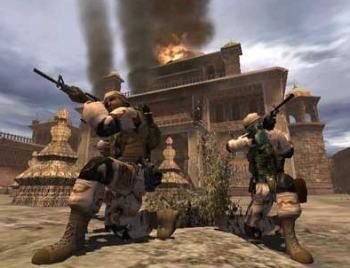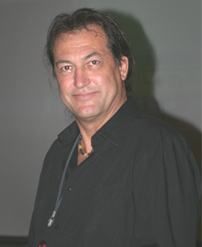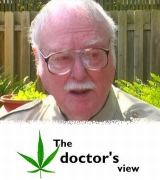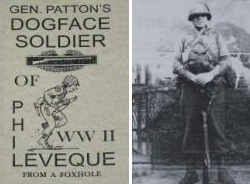
Publisher:
Bonnie King
CONTACT:
Newsroom@Salem-news.com
Advertising:
Adsales@Salem-news.com

~Truth~
~Justice~
~Peace~
TJP
Oct-26-2010 15:33

 TweetFollow @OregonNews
TweetFollow @OregonNews
PTSD Therapy: One Trillion Dollars
Dr. Phil Leveque Salem-News.com...U.S. Gov't Estimates $600 Billion... the probabilities of fraud are enormous
 War isn't a game, especially when you've seen the real thing. Photo: seriousgamessource.com |
(MOLALLA, Ore.) - Anyone who has read any of my articles on this subject will know that I have spent much time and effort putting my articles together and I have had few readers disagree with me.
I was a frontline Combat Infantryman as a Battalion Scout, Pointman and Forward Observer in WWII. My worst days were crossing the Rhine river with 150 men killed or wounded and 20 men lost attacking a German machine gun. My best day was the day my buddy and I captured 26 Nazi Officers. If those times weren’t harrowing enough, I’ll listen to your stories.
I have also seen soldiers “fall apart” on the front lines. I also have PTSD myself and I have been a doctor successfully treating about 1000 PTSD Vets plus probably a hundred or more civilians and policemen. I think I know what I am talking about??
I also know that PTSD has been a problem since men started fighting Saber Toothed Tigers and also the most dangerous animal, other men.
Opium and alcohol have been the drugs of choice since time one and we haven’t made much progress since. As a physician/pharmacologist, I was not surprised when Viet Nam PTSD Veterans told me that Cannabis/Marijuana (C/MJ) worked well for “battle terrors” and also PTSD. Some Viet Nam Vets called it “hootch” which I call alcohol. They told me hootch was better than Opium, maybe alcohol and much better than any drugs given them by Army or VA doctors. In fact, there are many Veterans groups who know and demand the right to use C/MJ as medicine. The VA has just allowed it without punishing the Vets.
There may be more than 1,000,000 PTSD Veterans in the U.S. but very few are being effectively treated by the VA. Because of the REEFER MADNESS atmosphere, C/MJ has been relegated to the back alleys but it is coming back very strong as medicine.
The VA has finally recognized that their treatments with Morphine-like drugs and the horrible anti-depressant drugs do not work well. It has spawned a whole bunch of “witch doctor” treatments, I will list some of them I know about:
1. Group therapy of PTSD Vets did not/does not really work well. Vets have their own “bitch sessions.”
2. Talking with a Therapist doesn’t work much better. Most PTSD Vets can’t talk about their “demons” to anybody.
3. Cognitive Behavioral Therapy (CBT) seems to be an offshoot of the previous. (WE CAN’T TALK ABOUT OUR WORST HORRORS)
4. They also have Cognitive Processing Therapy (CPT); and
 Albert Rizzo, 13 Oct 2009 |
6. Eye Movement Desensitizing and Reprocessing (EMDR) reminds me of “gourd rattling”.
7. They also have used SSRIs which are anti-depressants which work only rarely and have BAD side effects.
8. Family Therapy involves spouses and family. There is no question that the spouse and family are impacted as much as the PTSD Veteran. The relationship is frequently mutually destructive.
The VA says these “treatments” should last for months or even years. Many PTSD Vets will have these demons the rest of their lives- that is why all the expense.
This brings me to what is going on now in the face of poor results at unbelievable high costs. We have dog therapy, horse therapy, water therapy, massage therapy, art therapy and the most recent PTSD therapy model based on computer war games and touted by Dr. Albert (Skippy) Rizzo of The University of Southern California, it is called VIRTUAL REALITY EXPOSURE THERAPY1 which exposes PTSD Vets to authentic battle sounds which usually scare the pants off a real Combat Infantryman Veteran.
I assumed that I was one of the few which looked askance at his reported results (WE CAN’T STAND AUTHENTIC BATTLE SOUNDS). One factor Dr. Rizzo doesn’t seem to know is that PTSD is a spectrum of severity from 1 to 10. One being slight while 10 is the worst and usually includes those in insane asylums, murderers and suicides.
He reports successful therapy with 20 patients but buried in his article VR PTSD EXPOSURE THERAPY (VRET) are that many potential patients refused to participate or very quickly refused to continue participation. In the meantime his VRET “treatments” lasted from 90 to 120 minutes twice a week for 5 weeks. This is where One Trillion Dollars would go for this psychological therapy.
Many Veterans groups in the U.S., such as VETERANS TODAY, have pressed the VA and legislators the right to use C/MJ. It should be coming soon!!
1- VIRTUAL REALITY EXPOSURE THERAPY
 Got a question or comment for Dr. Leveque?
Got a question or comment for Dr. Leveque?Email him: Newsroom@Salem-News.com
 More information on the history of Leveque can be found in his book, General Patton's Dogface Soldier of Phil Leveque about his experiences in WWII.
More information on the history of Leveque can be found in his book, General Patton's Dogface Soldier of Phil Leveque about his experiences in WWII.Order the book by mail by following this link: Dogface Soldier.
If you are a World War II history buff, you don't want to miss it.<
Watch for more streaming video question and answer segments about medical marijuana with Bonnie King Dr. Phil Leveque.
Click on this link for other articles and video segments about PTSD and medical marijuana on Salem-News.com: Dr. Leveque INTERVIEWS & ARTICLES
Articles for October 25, 2010 | Articles for October 26, 2010 | Articles for October 27, 2010


Quick Links
DINING
Willamette UniversityGoudy Commons Cafe
Dine on the Queen
Willamette Queen Sternwheeler
MUST SEE SALEM
Oregon Capitol ToursCapitol History Gateway
Willamette River Ride
Willamette Queen Sternwheeler
Historic Home Tours:
Deepwood Museum
The Bush House
Gaiety Hollow Garden
AUCTIONS - APPRAISALS
Auction Masters & AppraisalsCONSTRUCTION SERVICES
Roofing and ContractingSheridan, Ore.
ONLINE SHOPPING
Special Occasion DressesAdvertise with Salem-News
Contact:AdSales@Salem-News.com



Terms of Service | Privacy Policy
All comments and messages are approved by people and self promotional links or unacceptable comments are denied.
jerry vest October 28, 2010 1:10 pm (Pacific time)
I agree with much that you describe as not useful for treatment of PTS(d); however, if integrative health practices of massage, reiki, meditation, acupuncture, group and individual gestalt therapies, water polo, therapeutic outings as intensively and extensively provided our injured warriors, over 50% are returned to the force fit for duty. See, Ft. Bliss Restoration and Resilience Center. I've worked with over 200 of these warriors and all have benefited enormously. There are excellent alternatives to meds and conventional MH. Give they a try.
Skip Rizzo October 27, 2010 8:11 pm (Pacific time)
Dear Retired PTSD Vet, First off, thank you for your service. Next, if you read the article I have on the Veterans Today site you would see the following content addressing your impression of VR Exposure Therapy as what was portrayed in the movie "A Clockwork Orange". I have pasted that paragraph here, but recommend you read the full article if you want an HONEST description of this form of treatment for PTS. Here is the section: "I also want to counter a claim here that has been leveled at Exposure Therapy by some who say that this is brainwashing and akin to a “Clockwork Orange” approach. As appealing as that may be to say when you have spent decades being pissed off at the shoddy level of respect and care that you have received, Clockwork Orange is no roadmap for what Exposure Therapy (ET) is about. In Clockwork Orange, the Malcolm McDowell character, was forcibly made to view violent imagery while being given a drug that made him violently ill, in order to condition him to be non-violent by creating an association between violence and the experience of painful nausea/sickness. This “aversive conditioning” approach bears no resemblance to what exposure therapy attempts to do. ET attempts to help the person confront and process their traumatic memories in a supportive environment, such that over time, they are better able to handle painful trauma memories by way of what is called an extinction process. Yes, learning new ways to respond and react are common to both approaches, but by very different means and for very different purposes. And I would go further to say that ANY treatment for emotional wounds or issues, really at its core, is about changing how people think about events in their life. The focus here is to help people go on with their lives in ways that support their health, happiness and adaptation to future challenges, and not about using some mind control process just to shut them up! Related to this, I have heard people refer to their experience of pharmacological treatments for PTS as “chemical lobotomies”. The ET approach is the exact opposite of that treatment as well, as its goal is to help people better deal with what has come before in order to be better equipped for what is still to come—it is not about further “numbing” the person to make them more “manageable”. So if you are still with me here, that is the basis for exposure therapy for PTS. Nothing in life is 100%, but the research so far supports ET as a safe, evidence-based treatment, and I believe it is worth the effort to follow this path in my own research to make it more effective through the use of VR simulations to engage PTS sufferers in this hopeful process." Here is the link: Posted Online (7-2010): Veterans Today Journal as, “Virtual Iraq/Afghanistan and how it is helping some Troops and Vets with PTSD”
http://www.veteranstoday.com/2010/07/29/virtual-iraqafghanistan-and-how-it-is-helping-some-troops-and-vets-with-ptsd/
Skip Rizzo, Ph.D.
Retired ptsd vet October 27, 2010 8:58 am (Pacific time)
Great article Dr. Leveque, sounds more like a virtual clockwork orange to me. Retired ptsd vet.
Skip Rizzo October 27, 2010 8:04 am (Pacific time)
And now one more thing, more for your audience, than for you Phil. Tell me that the Marine in this video clip is any less credible than you in his view about how his experience was handled using VR exposure therapy. Link at: http://www.youtube.com/watch?v=FUl6E76XPs4 For those readers out there dealing with PTSD from their OEF/OIF combat experiences who want help beyond the simplistic "Smoke a joint and forget about it" approach that ol' Philly "One Note Joke" Leverque is offering, there are excellent evidence-based treatments available both at the VA in Seattle and at Ft. Lewis at Madigan Army Medical Center. Modern thinking that you will never see in this column is that there are a range of good treatments out there to help service members, Vets and significant others and that by providing options for care,there is a good chance that one of these approaches will be helpful to you. You are NOT limited to just getting pharmacological approaches jammed down your throat as the only option (which is essentially is what ol' Philly here is promoting). While I have no gripe with Cannabis, there are many other effective options for help out there, so please do not look at the outdated thinking portrayed in this column as your only source of info on how to get help.
Skippy October 27, 2010 12:01 am (Pacific time)
If you are going to cite my work, at least use the latest Veterans Today article located here: http://www.veteranstoday.com/2010/07/29/virtual-iraqafghanistan-and-how-it-is-helping-some-troops-and-vets-with-ptsd/ Also, it appears that the level of fact checking of your claims is still as compromised as it was 3 years ago when you started your dogmatic campaign that one size fits all when it comes to PTSD treatment...I have no bones to pick with cannabis, but that is not going to work for everyone. Maybe you should stop looking through life through a straw, get over yourself, and be open to the idea that your narcissistic self is not the only person on the planet that is trying to make a difference in addressing the needs of our wounded warriors! Dr. Skip Rizzo
[Return to Top]©2025 Salem-News.com. All opinions expressed in this article are those of the author and do not necessarily reflect those of Salem-News.com.